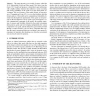Free Online Productivity Tools
i2Speak
i2Symbol
i2OCR
iTex2Img
iWeb2Print
iWeb2Shot
i2Type
iPdf2Split
iPdf2Merge
i2Bopomofo
i2Arabic
i2Style
i2Image
i2PDF
iLatex2Rtf
Sci2ools
120
click to vote
ECAI
2004
Springer
2004
Springer
The KGP Model of Agency
This paper presents a new model of agency, called the KGP (Knowledge, Goals and Plan) model. This draws from the classic BDI model and proposes a hierarchical agent architecture with a highly modular structure that synthesises various reasoning and sensing capabilities of the agent in an open and dynamic environment. The novel features of the model include: its innovative use of Computational Logic (CL) in a way that facilitates both the formal analysis of the model and its computational realisability directly from the high-level specification of the agents (a first prototype for the development of KGP agents exists, based upon a correct computational counterpart of the model), the modular separation of concerns and flexibility afforded by the model in designing heterogeneous agents and in developing independently the various components of an agent, and the declarative agent control provided through a context-sensitive cycle CL theory component that regulates the agent’s operation...
Related Content
| Added | 01 Jul 2010 |
| Updated | 01 Jul 2010 |
| Type | Conference |
| Year | 2004 |
| Where | ECAI |
| Authors | Antonis C. Kakas, Paolo Mancarella, Fariba Sadri, Kostas Stathis, Francesca Toni |
Comments (0)

